Find our books in our Bookshop page!
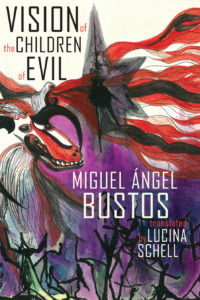
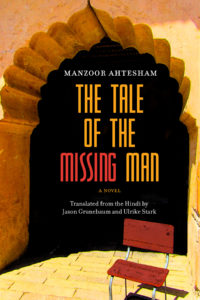 The Tale of the Missing Man
The Tale of the Missing Man
by MANZOOR AHTESHAM
Translated from the Hindi by JASON GRUNEBAUM AND ULRIKE STARK
Northwestern University Press
The Tale of the Missing Man (Dastan-e Lapata) is a milestone in Indo-Muslim literature. A refreshingly playful novel, it explores modern Muslim life in the wake of the 1947 partition of India and Pakistan. Zamir Ahmad Khan suffers from a mix of alienation, guilt, and postmodern anxiety that defies diagnosis. His wife abandons him to his reflections about his childhood, writing, ill-fated affairs, and his hometown, Bhopal, as he attempts to unravel the lies that brought him to his current state (while weaving new ones).
A novel of a heroic quest gone awry, The Tale of the Missing Man artfully twists the conventions of the Urdu romance, or dastan, tradition, where heroes chase brave exploits that are invariably rewarded by love. The hero of Ahtesham’s tale, living in the fast-changing city of Bhopal during the 1970s and ’80s, suffers an identity crisis of epic proportions: he is lost, missing, and unknown both to himself and to others. The result is a twofold quest in which the fate of protagonist and writer become inextricably and ironically linked. The lost hero sets out in search of himself, while the author goes in search of the lost hero, his fictionalized alter ego.
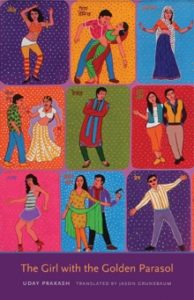 The Girl with the Golden Parasol
The Girl with the Golden Parasol
by UDAY PRAKASH
Translated from Hindi by JASON GRUNEBAUM
Yale Books
Uday Prakash’s novel of contemporary India is a tender love story—university student Rahul is swept away by a “sweet fever” of love for Anjali, the enchanting girl with the golden parasol. But Prakash’s tale is set in a world where the 3,000-year-old Hindu caste system still holds sway and social realities doom the chances of a non-Brahmin boy who loves a Brahmin girl.
The Girl with the Golden Parasol is the first English translation of Prakash’s work to be published in the United States. His audacious novel captures the profound contradictions of India today, where the forces aligned against change outweigh even the power of love.
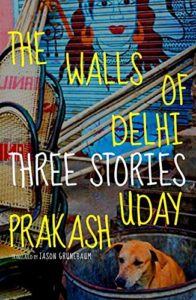
The Walls of Delhi. Three Novellas
by UDAY PRAKASH
Translated from Hindi by JASON GRUNEBAUM
Seven Stories
A street sweeper discovers a cache of black market money and escapes to see the Taj Mahal with his underage mistress; an Untouchable races to reclaim his life that’s been stolen by an upper-caste identity thief; a slum baby’s head gets bigger and bigger as he gets smarter and smarter, while his family tries to find a cure. One of India’s most original and audacious writers, Uday Prakash, weaves three tales of living and surviving in today’s globalized India. In his stories, Prakash portrays realities about caste and class with an authenticity absent in most English-language fiction about South Asia. Sharply political but free of heavy-handedness.
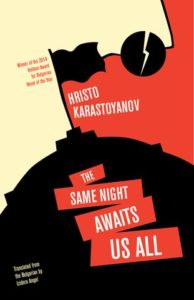
The Same Night Awaits Us All
by HRISTO KARASTOYANOV
Translated from Bulgarian by IZIDORA ANGEL
Open Letter Books
In June of 1923, a military coup established Aleksandar Tsankov as the new leader of Bulgaria. His fascist policies—especially aimed at the Bulgarian Communist Party—led to the failed September Uprising and an extended period of martial law.
At that same time, Geo Milev—one of Bulgaria’s most beloved poets—started a politically charged literary magazine with Georgi Sheytanov, a notorious anarchist on the run. Eighteen months later, the government assassinated both of them, although Milev’s body wouldn’t be found for another thirty years.
In this multilayered historical novel that calls to mind Laurent Binet’s HHhH, Hristo Karastoyanov deconstructs this period, blending this adventurous tale of resistance with current-day reflections on what this period meant to Bulgaria and the world.
“Karastoyanov’s novel is set in Bulgaria in the 1920s, but also invokes the spirit of John Lennon, and brings to mind Dostoevsky’s Demons with its anarchists and assassins, lighthouses, zeppelins, and synthesis of modernist narrative techniques and Balkan storytelling.”—Berliner Zeitung
Winner of the 2014 Helikon Award for Bulgarian Novel of the Year Prize
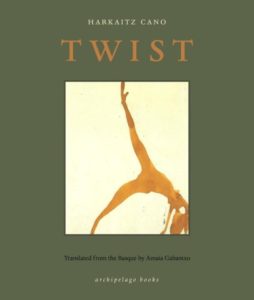
Twist
by HARKAITZ CANO
Translated from Basque by AMAIA GABANTXO
Archipielago Books
Set in the politically charged climate of the Basque Country in the 1980s, Twist relates the disappearance and brutal murder of two ETA militants at the hands of the Spanish army. The novel centers on their friend and fellow activist Diego Lazkano, who, since revealing his comrades to the authorities, has been tormented by guilt. With Diego as a point of departure, the novel enters into the lives of numerous characters directly or indirectly implicated in the murder. In Twist, Harkaitz Cano provides a multi-vocal account of a conscience and a society in turmoil. It is a tale of guilt, love, friendship, and betrayal, and of the difficulties that arise when one flees one’s own skin to inhabit the minds of others.
A prolific writer of novels, short stories, poetry, essays, plays, radio and television scripts, and comics, Harkaitz Cano is one of the leading literary figures of the Basque Country.
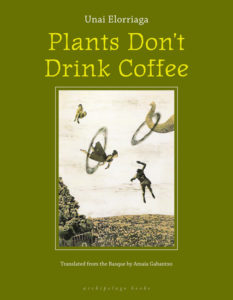
Plants Don’t Drink Coffee
by UNAI ELORRIAGA
Translated from Basque by AMAIA GABANTXO
Archipelago Books
Four stories narrated from four different perspectives criss-cross throughout this powerful and lighthearted novel. The young Tomas — who wants above all else to be intelligent — draws us into the web of his curious mind, magnifying misadventures and stumbling upon all sorts of small wonders. Through an omniscient narrative, we learn all about his eccentric entourage, from their surrealist creation of a rugby field on a golf course, the mystery of why a couple of forty years never married, and the intrigue surrounding his grandfather’s role in a European carpentry competition.
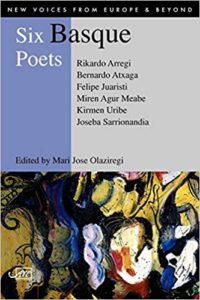
6 Basque Poets
by MARIJO OLAZIREGI ed.
Translated from Basque by AMAIA GABANTXO
Arc Publications
‘Six Basque Poets’ is the second volume in a new series of bilingual anthologies which brings the work of contemporary poets from Europe and beyond to a wider English-language readership, a series which aims to keep a finger on the ‘here and now’ of international contemporary poetry. The six poets included in this collection — Rikardo Arregi, Bernado Atxaga, Felipe Juaristi, Miren Agur Meabe, Kirmen Uribe and Joseba Sarrionandia — have played a defining role in the development of Basque-language poetry in the last 30 years, since the arrival of what is now referred to as the ‘democratic age’ in Spain and the Basque Country. They represent the diversity of voices and poetic schools that populate the contemporary Basque literary scene where a variety of tendencies has emerged in recent decades. Direct, moving and thought-provoking, the poetry in the present volume gives us insight into the preoccupations of a literary milieu which may be marginalized by its use of an ancient language not spoken outside its territory but which is as powerful and original in its production as any of the literary centres in today’s Europe.
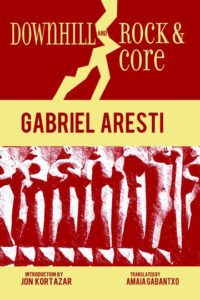
Downhill and Rock & Core
by GABRIEL ARESTI
Translated from Basque by AMAIA GABANTXO
University of Nevada Press
These 2 books, collected into one volume here, Downhill (1959, Maldan behera in Basque) and Rock & Core (1964, Harri eta herri in Basque) were foundations of modern Basque literature and influenced pride in Basque language, culture, and expression for generations of Basques! We are so delighted to bring them to you in English for the first time!
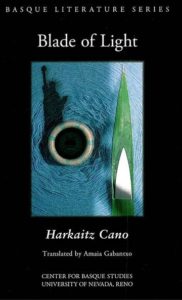
Blade of Light
by HARKAITZ CANO
Translated from Basque by AMAIA GABANTXO
University of Nevada Press
Blade of Light is a uchronia- an alternate history-in its main plot line, Hitler has won the Second World War and now dominates Europe. He then decides to conquer first Manhattan and then the whole American continent. His journey takes him to New York on a ship aboard which Charles Chaplin is also traveling. Chaplin has been imprisoned and tortured on account of his film The Great Dictator, which remains a pesky thorn in Hitler’s side. On a second level another story is told-that of a stowaway who traveled to New York in 1886 hidden inside the crown of the Statue of Liberty. The fate of this stowaway, Olivier Legrand, crosses Chaplin’s, who manages to escape from his torturers and finds refuge with the now old man. The originality of the story has its narrative counterpoint in Cano’s attractive prose style, full of images and lyricism. A master of “what if?” and suspense the novel is also an important reflection on life and the process of writing and artistic creation.
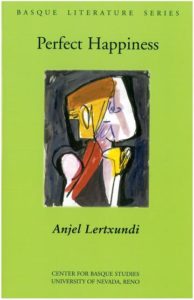
Perfect Happiness
by ANJEL LERTXUNDI
Translated from Basque by AMAIA GABANTXO
University of Nevada Press
Perfect Happiness can be described as a realist novella with lyrical overtones. It explores how witnessing a terrorist assassination affects a teenage girl’s life over a span of fourteen years. Against this backdrop Lertxundi explores one of his recurring themes: the relationship between art and death. Perfect Happiness is moral without being didactic, and confessional – as well as natural and fluid – in tone. Confronting its horrific theme with profound existential understanding, it is an eloquent plea for the right to beauty and happiness and the importance of following one’s conscience.
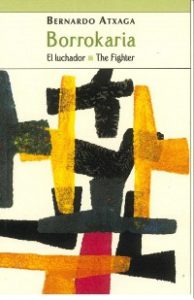
The Fighter
by BERNARDO ATXAGA
Translated from Basque by AMAIA GABANTXO
Etxepare Euskal Institutoa
The novel is made up of three different texts. In the first one, a man who recalls his past and fears his decline meets his destiny; in the second another man writes about the boxing match he’s about to fight in in Reno, Nevada; in the third the narrator reflects on the images that people leave behind when they die. Three different texts, a single story.
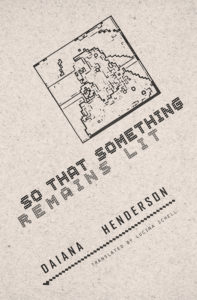
So That Something Remains Lit
by DAIANA HENDERSON
Translated from the Spanish by LUCINA SCHELL
Cardboard House Press
“Something remains to be said about childhood / beyond what we’ve said / and keep on saying.” Here is where Daiana Henderson’s poems, rendered beautifully in Lucina Schell’s translation, have come to bear: in the space between nostalgia and brusqueness, between lyric abandon and banal grit. As I read through this collection, which draws me in for its fresh, arresting take on anecdote, I find myself lulled and jolted by details that contain many dimensions of time, a speaker firmly rooted in the present who also already knows “everything they’re going to say.” In this, the collection is fiercely timeless and also very contemporary – both interested in poetry’s elegiac qualities, and also skeptical of its ability to address, commemorate, or mark experience, to make it newly, freshly visible. So That Something Remains Lit stirred me in these contradictions. Daiana is definitely a poet to read; I’m excited to see more from her. — ALEXIS ALMEIDA
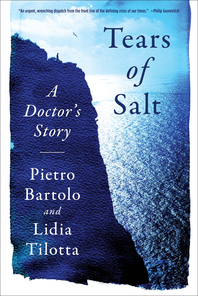
Tears of Salt: A Doctor’s Story
by PIETRO BARTOLO and LIDIA TILOTTA
Translated from Italian by CHENXIN JIANG
Norton
Situated more than one hundred miles off Italy’s southern coast, the rocky island of Lampedusa has hit world headlines in recent years as the first port of call for hundreds of thousands of African and Middle Eastern refugees fleeing civil war and terrorism and hoping to make a new life in Europe. Dr. Pietro Bartolo, who runs the lone medical clinic on the island, has been caring for many of them—both the living and the dead—for a quarter century.
Tears of Salt is Dr. Bartolo’s moving account of his life and work set against one of the signal crises of our time. With quiet dignity and an unshakable moral center, he tells unforgettable tales of pain and hope, stories of those who didn’t make it and those who did. Tears of Salt is a lasting work of literature and an intimate portrait of a remarkable man whose inspiring message rings clear: “We can’t and we won’t be governed by our fears.”
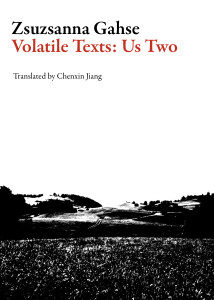
Volatile Texts: Us Two
by ZSUZSANNA GAHSE
Translated from German by CHENXIN JIANG
Dalkey Archive
The narrator of Volatile Texts: Us Two falls in love with Pierre, the book’s secret protagonist. During their trysts she rediscovers Switzerland, a place where every valley has its own language and every person is translated. It’s a perfect microcosm of Europe―a collection of accents, languages, and landscapes. Volatile Texts is Zsuzsanna Gahse’s ironic and prescient meditation on a Europe that is disintegrating in the same way that the Alps disintegrate into individual lakes and valleys. Yet language itself is the true subject of these prose miniatures, which are volatile and unstable because they expose language as an arbitrary construct made of interchangeable parts; however, this is also what makes the book such an exciting read.
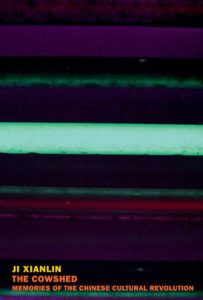
The Cowshed: Memories of the Chinese Cultural Revolution
by JI XIANLIN
Translated from Chinese by CHENXIN JIANG
NYRB
The Chinese Cultural Revolution began in 1966 and led to a ten-year-long reign of Maoist terror throughout China, in which millions died or were sent to labor camps in the country or subjected to other forms of extreme discipline and humiliation. Ji Xianlin was one of them. The Cowshed is Ji’s harrowing account of his imprisonment in 1968 on the campus of Peking University and his subsequent disillusionment with the cult of Mao. As the campus spirals into a political frenzy, Ji, a professor of Eastern languages, is persecuted by lecturers and students from his own department. His home is raided, his most treasured possessions are destroyed, and Ji himself must endure hours of humiliation at brutal “struggle sessions.” He is forced to construct a cowshed (a makeshift prison for intellectuals who were labeled class enemies) in which he is then housed with other former colleagues. His eyewitness account of this excruciating experience is full of sharp irony, empathy, and remarkable insights into a central event in Chinese history.
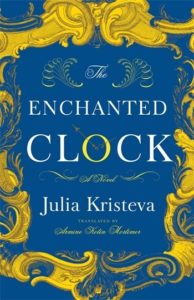
The Enchanted Clock.
by JULIA KRISTEVA
Translated from French by ARMINE KOTIN MORTIMER
Columbia University Press
In the Palace of Versailles there is a fabulous golden clock, made for Louis XV by the king’s engineer, Claude-Siméon Passemant. The astronomical clock shows the phases of the moon and the movements of the planets, and it will tell time—hours, minutes, seconds, and even sixtieths of seconds—until the year 9999. Passemant’s clock brings the nature of time into sharp focus in Julia Kristeva’s intricate, poetic novel The Enchanted Clock. But when the clock is stolen and a young writer for Nivi’s magazine mysteriously dies, the clock is found near his body. The Enchanted Clock combines past and present, jumping back and forth between points of view and across eras from eighteenth-century Versailles to the present day. Its stylistically inventive narrative voices bring both immediacy and depth to our understanding of consciousness. Part detective mystery, part historical fiction, The Enchanted Clock is a philosophically and linguistically multifaceted novel, full of poetic ruminations on memory, love, and the transcendence of linear time. It is one of the most illuminating works of one of France’s great writers and thinkers.
